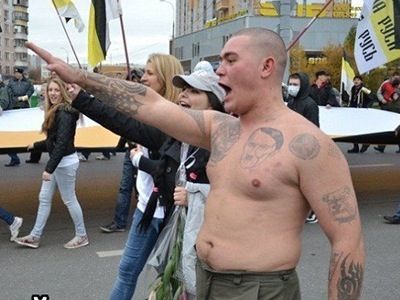For the past three years I've been involved with a Russia-based international organization, World Without Nazism, determined to call attention to resurgent Nazi movements, especially in Europe. It's genuine, horrifying stuff. In Greece, Hungary, Latvia, France, Ukraine and Russia itself there are growing political movements that recreate the icons, ideology and actions of Nazi Germany often with links to surviving Nazis and organizations. I've seen it up close in Riga, Latvia, and spent enough time in Moscow and Strasbourg to understand the depth of the problem. These movements are becoming mainstream and growing bolder.
Sitting with Russian leaders in Moscow and elsewhere is instructive. They're anti-Nazi out of conviction and out of bitter experience. Russian lost more than 20 millions souls in the struggle with Germany. The memory of the Great Patriotic War is alive. "Never Again" means something concrete to Russians as it does to Jews everywhere.
Putin sits atop the new Russia, and its old memories. He's been elected. Outside of the big cities he remains popular, if only because Russians tolerate tsars and commissars and presidents in ways Americans would never do. It's not Stalin's Russia by a long shot. But there are residual elements of autocracy, of the cult of the leader, of corruption and lawlessness that are real and jarring.
Putin's Sochi Olympic venture has a good deal to do with historic memory, of the War and the Soviet Union. It's a showcase for a Russia without Stalin and without fear of resurgent Nazism. So far, there's been no terrorism, no significant static about Russia's awful attitudes toward homosexuals, and a sense of Russia re-entering the world arena as a strong nation that must be dealt with.
It's not that things are smooth and easy. The popular opposition to the pro-Putin government in Ukraine, ongoing battles with Islamic terrorism, the distasteful role as protector of Iran and Syria and the resurgence of reactionary politics across Russia are just part of what Putin faces.
There's no reason to sugarcoat the Putin years or to call them by less than their names. In spite of all, it may be in the world's interest to hope that the Olympics are successful, warts and all, not so much because we condone Putin, but because of what the games could do for the Russian soul. A little success, a little sense of emergence from a dark past could liberate parts of the Russian soul that have been stonily silent for too long. There's a human warmth, a sweetness, to Russians that struck me most while attending concerts, classical concerts. It surprised me. But it may be the thing that leads them out of a century of darkness.
I'll continue to work with anti-Nazi Russians, and to hope for a better climate for human progress in Russia and with Russia. If Putin can pull off these Olympics, all things are possible. Maybe.

